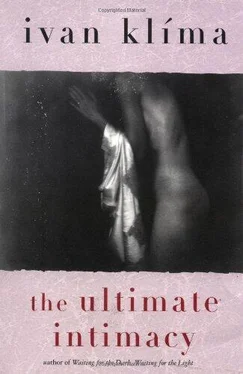Ivan Klima - The Ultimate Intimacy
Здесь есть возможность читать онлайн «Ivan Klima - The Ultimate Intimacy» весь текст электронной книги совершенно бесплатно (целиком полную версию без сокращений). В некоторых случаях можно слушать аудио, скачать через торрент в формате fb2 и присутствует краткое содержание. Год выпуска: 1998, Издательство: Grove Press, Жанр: Современная проза, на английском языке. Описание произведения, (предисловие) а так же отзывы посетителей доступны на портале библиотеки ЛибКат.
- Название:The Ultimate Intimacy
- Автор:
- Издательство:Grove Press
- Жанр:
- Год:1998
- ISBN:нет данных
- Рейтинг книги:3 / 5. Голосов: 1
-
Избранное:Добавить в избранное
- Отзывы:
-
Ваша оценка:
- 60
- 1
- 2
- 3
- 4
- 5
The Ultimate Intimacy: краткое содержание, описание и аннотация
Предлагаем к чтению аннотацию, описание, краткое содержание или предисловие (зависит от того, что написал сам автор книги «The Ultimate Intimacy»). Если вы не нашли необходимую информацию о книге — напишите в комментариях, мы постараемся отыскать её.
The Ultimate Intimacy — читать онлайн бесплатно полную книгу (весь текст) целиком
Ниже представлен текст книги, разбитый по страницам. Система сохранения места последней прочитанной страницы, позволяет с удобством читать онлайн бесплатно книгу «The Ultimate Intimacy», без необходимости каждый раз заново искать на чём Вы остановились. Поставьте закладку, и сможете в любой момент перейти на страницу, на которой закончили чтение.
Интервал:
Закладка:
He was also taken by the notion that whereas for the baroque the essential stylistic feature was the circle, in the case of revolutionary architecture it ought to be the spiral, as a form moving upwards to the Communist future of mankind. In his view, the avant-gardists had created a genuine revolutionary art which could be looked to for inspiration.
At first — like others of his generation — he had sincerely believed in progress and socialism. He had taken part in two youth building projects, and unlike most of the other participants he had managed to draw some benefit from them in career terms: not only was he able to try his hand at most building work but he also became familiar with architectural practice and soon realized the yawning gulf that existed in his profession between the reality on the ground and what was officially proclaimed.
At the second youth project he made the acquaintance of Katarina. She was a medical student from Slovakia. He managed to get her pregnant so soon that they were married four months after their return from the project. They never set up home together. For three years they barely saw each other twice a month except during the holidays, part of which they were able to spend together. When he got his first job with a design office he was assigned a flat and hoped that his wife would finally join him. She refused, having found another man in the meantime.
His second wife was called Kateřina and worked as a draughtsman. They were ill-matched socially. His wife was aware of it and tried to show her gratitude by her almost maternal care of him and unreserved recognition of his male supremacy. This suited him well and led him to regard his second marriage as successful.
As he grew older his tendency towards pedantry became more pronounced. He demanded order — from his employees at work and from his wife and daughter at home. Order in his terms meant punctuality and strict observance of all his instructions. He could not abide carelessly sketched plans, or to find a towel hung up sloppily in the bathroom in the morning — even a speck of cigarette ash on the table would spoil his mood for the remainder of the day. The sorts of things that ran counter to his idea of order were unplanned events, daydreaming, unexpected guests, dawdling and actions with unconsidered or even dangerous consequences.
Preserving this order enabled him to become an excellent organizer.
He could be relied on totally and because of this quality the directors of the design firms where he worked overlooked the fact that from time to time he would act with too much independence, and that he would always refuse jobs that he felt were beneath him.
Unlike many of his colleagues, who soon realized that nothing was required of an architect other than to build cheaply and not be inspired by anything that might come from the decadent West, he did not sit back but got hold of foreign journals and although he could not put any of the things he read into practice, at least he retained an awareness of what was being built around the world. As soon as the political thaw set in in the sixties, he managed to push through a number of interesting designs for exhibition pavilions.
When he met Bára, his first daughter had just married and the daughter from his second marriage was sixteen. By that time he had achieved recognition as a prominent architect who would be commissioned to design arts centres, Communist Party secretariats, experimental schools, and luxury holiday centres, or for the reconstruction of important historical buildings, rather than housing estates. At the age of only forty-three, he had already received a number of awards and even a state prize.
Although working within the regime, he never identified with it in spirit. Disillusioned with a government that had fulfilled so little of what it had once promised, he would read with unconcealed satisfaction articles in the foreign press unmasking its deceit and above all criticizing the government's uncreative and mostly hideous architecture. He skilfully contrived to avoid taking any post of political responsibility — not only because he was not sure how long the regime would survive, but also because he was afraid it might take him away from his work.
He was rich but lived abstemiously, not smoking and only taking the occasional drink, always remaining sober, since to get drunk would affect his competence at work the next day. He played tennis, and in the summer he would take a seaside holiday with his wife and daughter — in earlier years with both his daughters. Though of smallish build, he gave the impression of being bulky and even at the age of forty his hair had not started to go grey. His eyes were his most interesting feature: deep-set beneath thick eyebrows, and with golden-brown foxy irises. He had the ability to gaze at an interlocutor fixedly, so that he seemed to be listening intently, even when his mind was
elsewhere. As a result, women who found him attractive, or who wanted to appeal to him, could be given the impression that he found them so captivating that he couldn't take his eyes off them, that his look actually betrayed his feelings for them. In reality nothing of the sort occurred to him.
Whereas he felt himself to be at the peak of his powers, his wife had aged prematurely. She had never shone intellectually, but as time went by she started to lose interest in anything that interested him or the society in which he moved. Whenever she spoke he felt ashamed of her. He preferred not to take her to social occasions where the majority of his colleagues and contemporaries had much younger and more interesting wives. And she genuinely made no objection.
But it was not he who first made a play for Bára. Bára herself was aroused by the thrill of the chase when she first chanced to meet him at the Architects' Club. And as she was interesting, beautiful and young, as well as game for anything, Samuel yielded. He exchanged a wife-mother for a wife-daughter in a move that was so radical it must have been the only significant change in his life that he never managed to come to terms with.
7
Daniel bought Hana a gold bracelet for her fiftieth birthday.
'But there's no way I can wear it,' she said when she opened its case.
'Why not?'
'So much gold. It doesn't suit me and I don't have any occasion to wear it.'
'You can wear it this evening. You know I've booked a table at the Chinese restaurant.'
'So you said, but it wasn't necessary. We could have had a lovely dinner at home.'
'We have dinner at home every evening.'
'Precisely, and restaurants are so expensive now.'
Hana refused to take their new-found wealth into account. He liked that about her, but at the same time he found her reluctance to accept change irritating.
'I'm looking forward to the restaurant,' Marek piped up.
'I don't want to go anywhere,' Magda grumbled. 'I've got to study. We've got a maths test tomorrow.'
'You're stupid. They give you fortune cookies after the meal.'
'Marek, fortune cookies are superstitious and stupid,' he rebuked his son.
'And now on top of everything else we're doing algorithms. If somebody doesn't explain them to me I won't be able to calculate a single row.'
'Algorithms? What are they?' Daniel asked, expressing interest.
'That's just what I'd like to know.'
'An algorithm is a procedure for solving specific problems by carrying out a precisely determined sequence of steps,' Marek quoted the definition. 'It's what computer programs are all based on,' he added. 'And you've got a computer in your office, Dad.'
'Indeed I do have a computer, but I haven't the foggiest idea what goes on inside it.'
'That's your loss.'
In the meantime Magda had rummaged out her textbook. 'That's what I have to calculate: make an algorithm to determine the numerical sum of the given natural number a. In determining each of the numerals you may use only arithmetical operations and whole-number division to determine the share and remainder.'
Читать дальшеИнтервал:
Закладка:
Похожие книги на «The Ultimate Intimacy»
Представляем Вашему вниманию похожие книги на «The Ultimate Intimacy» списком для выбора. Мы отобрали схожую по названию и смыслу литературу в надежде предоставить читателям больше вариантов отыскать новые, интересные, ещё непрочитанные произведения.
Обсуждение, отзывы о книге «The Ultimate Intimacy» и просто собственные мнения читателей. Оставьте ваши комментарии, напишите, что Вы думаете о произведении, его смысле или главных героях. Укажите что конкретно понравилось, а что нет, и почему Вы так считаете.






![Theresa Cheung - The Dream Dictionary from A to Z [Revised edition] - The Ultimate A–Z to Interpret the Secrets of Your Dreams](/books/692092/theresa-cheung-the-dream-dictionary-from-a-to-z-r-thumb.webp)





